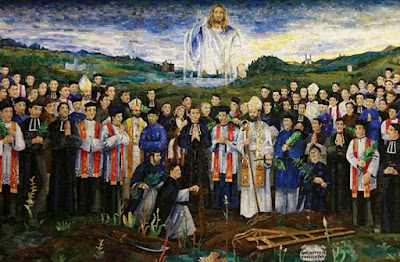St. John the Baptist plays a prominent role every year in our Advent preparations for Christmas. John is the great preparer, proclaiming “Prepare Ye, the way of the Lord.” John is a precursor or forerunner for the Lord in a number of ways.
The angel Gabriel told Zechariah that John would go before
the Lord in the spirit and power of Elijah to turn the hearts of
fathers toward children and the disobedient to the understanding of the
righteous, to prepare a people fit for the Lord.” So, John’s very
conception and birth were oriented to his role as Jesus’ herald.
John’s ministry of preaching and baptism prepared people for
Jesus’ ministry. “I baptize you with water for repentance, but he who is coming
after me is mightier than I…he will baptized with the Holy Spirit and with
fire”
Today, we read the Gospel of John’s martyrdom. In his
martyrdom, he foreshadows Christ’s own suffering and death. Just as he heralded
Christ’s birth, he also precedes Him in dying unjustly at the hands of corrupt
rulers.
The Old Testament prophets foretold how a Precursor would
precede the coming of the Lord. Speaking through Malachi God said, “Behold, I
send my messenger, and he will prepare the way before me.” Jesus himself
references this prophecy about John as the forerunner.
St. Augustine, whose feast we celebrated yesterday, spoke
about John as the forerunner and precursor. Augustine wrote, “John was the
voice, but the Lord is the Word. John is a friend, but the Lord is the
Bridegroom. John was placed at the frontier of both Testaments: he pointed out
the coming Christ, and by dying before Him, he was His precursor in death.”
So it is clear, through scripture and the Church Fathers
that God made John the Forerunner, but WHY? Why did God choose to act this why?
He didn’t need a forerunner, yet he chose to arrange salvation history in this
way.
All throughout salvation history, God prepares before He
acts. Before the Flood, God prepared Noah by warning him and telling him to
build the ark. Before the giving of the Ten Commandments, the people were to
prepare themselves through consecrations, washing, and abstaining. Before David
is made King, Samuel is sent to anoint David. Before serious judgments like the
Babylonian exile, God sends prophets like Isaiah, Jeremiah, Ezekiel to call
Israel to repentance.
God gives us a chance to ready ourselves, to turn our
attention to the activity of God. God is no doubt preparing each of us right
now for something later. God prepares us for heavy crosses by sending us little
ones first. God prepares us to teach the faith, by giving us opportunities to
learn it ourselves. God prepares us for acts of generosity, by blessing us with
good things now, so we can give them away later. God prepares us to be the
saints of the 21st century, by drawing us to honor the saintly witnesses
of those who have gone before us.
May we prepare well for all that God has in store for us,
through repentance, and study, and gratitude for our blessings, and readiness
to serve his Holy Will for the glory of God and the salvation of souls.
With trust in God’s great providence, we entrust our needs
for the good of the Church and the world.
For the Church: That, like St.
John the Baptist, she may always prepare the world to receive Christ by
proclaiming the truth with courage and humility.
For world leaders and rulers: That they may govern with justice and integrity,
and not follow the example of Herod who shed innocent blood, but instead
protect the dignity of every human life.
For those who suffer persecution or injustice: That, they may remain steadfast
in faith and know the consolation of God’s presence.
For those experiencing any kind of hardship or sorrow,
isolation, addiction, or disease: may they know God’s strength and peace and
the assistance of the Christian people.
For our beloved dead, especially
those who bore witness to Christ in their lives: That, like John the Baptist,
they may rejoice to behold the Bridegroom in eternal life.
God our Father, you sent St. John the Baptist as the
forerunner of your Son, to prepare a people fit for the Lord. Hear our prayers
and prepare us by your grace for the glory of eternal life. Through Christ our
Lord.


















